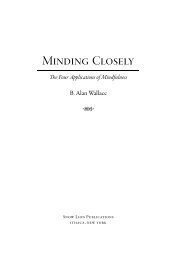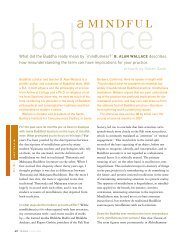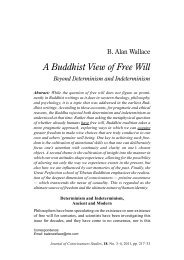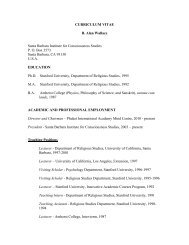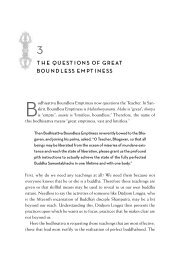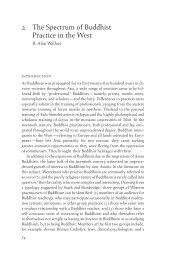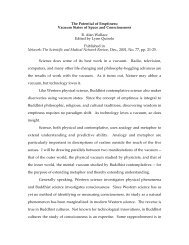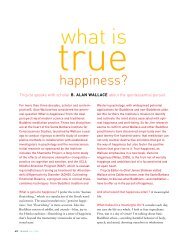“A Science of Consciousness: Buddhism (1), the ... - B. Alan Wallace
“A Science of Consciousness: Buddhism (1), the ... - B. Alan Wallace
“A Science of Consciousness: Buddhism (1), the ... - B. Alan Wallace
You also want an ePaper? Increase the reach of your titles
YUMPU automatically turns print PDFs into web optimized ePapers that Google loves.
occurs, N occurs; if N doesn’t occur, M doesn’t occur; and if M doesn’t occur, N<br />
doesn’t occur. Such a correlation could imply that <strong>the</strong> occurrence <strong>of</strong> N has a<br />
causal role in <strong>the</strong> production <strong>of</strong> M, or vice versa; or it could imply that N and M<br />
are actually <strong>the</strong> same phenomenon viewed from different perspectives. There is<br />
not enough scientific knowledge at this point to determine which <strong>of</strong> <strong>the</strong>se types<br />
<strong>of</strong> correlation is <strong>the</strong> correct one. But Damasio seems to overlook this ambiguity<br />
and simply decrees <strong>the</strong> equivalence <strong>of</strong> mental and neural processes, without any<br />
logical or empirical justification. In o<strong>the</strong>r words, this equivalence is simply a<br />
metaphysical belief.<br />
While writing this essay, I questioned Damasio on this point, and he<br />
responded that in his book The Feeling <strong>of</strong> What Happens 12 he goes to great pains to<br />
explain that neural patterns are not equivalent to mental images. There is an<br />
explanatory gap, he points out, regarding <strong>the</strong> process by which a neural pattern<br />
is converted to a mental image; and neuroscience, in particular, and science, in<br />
general, may never be able to bridge that gap. He fur<strong>the</strong>r acknowledges that <strong>the</strong><br />
“physicality” <strong>of</strong> mental phenomena has not yet been identified scientifically; it is<br />
simply a working hypo<strong>the</strong>sis. As hard as I try, I just can't see <strong>the</strong> logic in his<br />
position. To say that A is B, implies an identity, not a causal relation between two<br />
distinct entities A and B. He seems to be saying that mental phenomena are<br />
biological phenomena produced by prior biological phenomena. But that still<br />
implies that mental phenomena are equivalent to some kind <strong>of</strong> biological<br />
9



